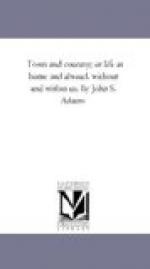We saw the massive key of that old French prison-house, the Bastile, presented to General Washington by that friend of freedom and humanity, General Lafayette, soon after the destruction of that monument of terror. We noticed that depredations had been committed by visitors upon the costly marble fire-frame, which was a gift to Washington.
Mr. Washington being called to the farm, we availed ourselves of the services of the old negro before mentioned, who led us around the estate. On our way to the tomb, we passed through what we judged to be a kitchen. The floor was brick, and a fireplace occupied nearly all of one side of the room; one of those old-fashioned contrivances which were in vogue in those days when people went more for comfort than appearance. Half a score of negroes were in the room, who gazed at us as we entered, covered with dust and dirt, the real free soil of Virginia. They seemed to think our intentions more of a warlike than a peaceable nature. We soon inclined them to the latter belief, however, by gently patting a curly-headed urchin upon the head, and distributing a few pennies among the crowd.
Five minutes’ walk, and we were at the tomb.
“There is the old General,” said the aged negro, as he touched lightly the sarcophagus with his cane; “that, yonder, is his wife,” pointing to a similar one at the left.
Silently I stood and gazed at the marble coffin that held the mortal remains of him whom, when he lived, all people loved, and the memory of whom, now that he has passed from our material vision, all people revere. A few branches of cypress lay upon it, and at its base a few withered flowers.
The sarcophagus that holds the dust of Washington is placed upon a low pedestal, formed of brick. A brick wall is at the sides, and an iron slat fence or gateway in front. Over this gateway a white stone is set in the brick-work, and bears this inscription:
WITHIN THIS ENCLOSURE ARE
THE REMAINS
OF
General George Washington.
Short, indeed, but how full of food for thought!
“General George Washington!” He needs no long and fulsome epitaph carved in marble to tell his worth. Did his memory depend upon that alone, the marble would crumble into dust, mingle with his, and his name pass away with the stone that man vainly thought would preserve it. No; his monument is a world made free, and his memory as lasting as immortal mind. Wherever the light of freedom shall penetrate, it will bear on its every glistening ray his cherished name; and whenever and wherever men shall struggle with oppression, it shall inspire them with vigor, and cheer them on to victory.
Marble will perish, and monuments of adamant will crumble to dust; but the memory of Washington will live as long as there is a heart to love, or a mind to cherish a recollection of goodness.




